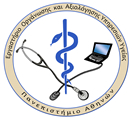Symptoms
In some cases the virus does not produce any symptoms and persons do not know that they are infected!
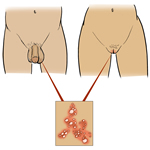 1. One or more blisters on or around the genital area, the anus or the mouth, which break open and produce painful sores.
Initially flu-like symptoms may occur, such as: 1. One or more blisters on or around the genital area, the anus or the mouth, which break open and produce painful sores.
Initially flu-like symptoms may occur, such as:
|
| |
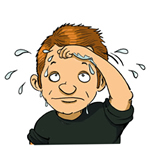 2. Fever 2. Fever
|
| |
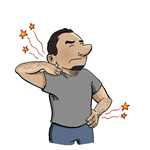 3. Body aches 3. Body aches
|
| |
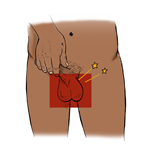 4. Swollen lymph nodes 4. Swollen lymph nodes
|
Transmission
The virus is usually transmitted through sexual contact (vaginal, anal, oral). The virus may be transmitted through contact with the skin or secretions of an infected person even when there are no obvious sores (wounds). Also, if an infected person touches the sores or the fluids from the wounds, then the virus may be spread to other parts of the infected person's body. This is of particular concern if this area is sensitive, e.g. the eyes. This can be avoided by not touching the sores or fluids and by thoroughly washing hands following such contact. Also, in rare cases, the virus can be transmitted from a pregnant woman to her baby.
Treatment
Seek medical assistance for the treatment of genital herpes. There is no cure for the virus; however there are treatment options for the management of symptoms. The sores usually heal within 2-4 weeks but may re-appear in the form of flare-ups several times (usually 4 or 5) in one year's time. Eventually the outbreaks are fewer. Antiviral drugs may prevent or reduce symptoms during the course of antiviral therapy. Furthermore, the daily use of antiviral drugs may reduce the possibility of transmitting the virus to sexual partners.
-
Keep the affected area clean using either plain or salt water.
-
Apply an ice pack, wrapped in a flannel, on the sores to soothe pain.
-
Drink plenty of fluids to dilute urine. This will make passing urine less painful.
-
Avoid wearing tight clothing because it may irritate the blisters and ulcers.
Prevention
-
Avoid having sex or have a mutually committed monogamous relationship with a partner who has been tested and is not infected
-
Always use a condom while having any kind of sexual intercourse, from start to finish, with every sexual partner; the use of condom may help prevent genital herpes from spreading, however there still is a chance you might get the infection. The condom protects only the areas covered!
-
Talk sincerely and openly with your partner for genital herpes and other sexually transmitted diseases
If you have genital herpes:
-
Inform your previous sexual partners so that they seek medical help.
-
Avoid sexual activity when you have obvious symptoms.
-
Be aware that even if you don't have symptoms you can pass the infection to your partner.
When to seek medical advice
If you have genital herpes:
-
Inform your previous sexual partners so that they seek medical help.
-
Avoid sexual activity when you have obvious symptoms.
-
Be aware that even if you don't have symptoms you can pass the infection to your partner
When to seek medical advice
You must see your doctor
-
If you develop symptoms, such as an unusual wound in your genital area
-
If a sexual partner of yours has been diagnosed with or has presented symptoms that could be associated with genital herpes, even if you do not have any symptoms
References
cdc
nhs















